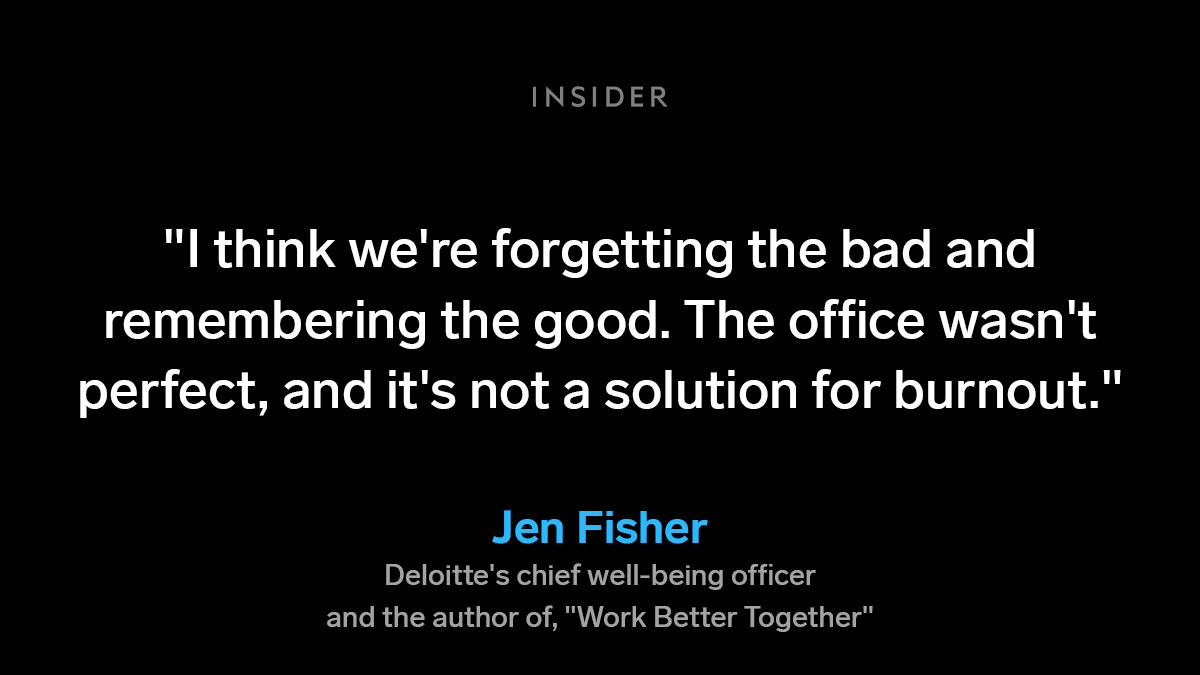Many people enjoy the flexibility of working from home, but plenty are eager to return to the office.
For some, going to an office is a way to reclaim work-life boundaries and reduce stress. ⬇️
businessinsider.com/burnout-sympto…
For some, going to an office is a way to reclaim work-life boundaries and reduce stress. ⬇️
businessinsider.com/burnout-sympto…
With only the slightest stretch, Wyatt Carney can get from his bed to his "home office" — a cramped desk nook that sits flush against his footboard — without his feet touching the floor.
businessinsider.com/burnout-sympto…
businessinsider.com/burnout-sympto…

Starting this month, his company's offices will reopen two days per week, and he’s already fantasizing about what will surely be a heady return.
He especially can’t wait to shut down his computer at the end of the workday and leave it there.
businessinsider.com/burnout-sympto…
He especially can’t wait to shut down his computer at the end of the workday and leave it there.
businessinsider.com/burnout-sympto…
While many people have reveled in the freedom and flexibility of working from home, plenty of others feel overworked, underslept, and burned out.
Some see going back to the office as a potential solution.
businessinsider.com/burnout-sympto…
Some see going back to the office as a potential solution.
businessinsider.com/burnout-sympto…

When it comes to remote work, there are two basic types of people, according to a study in the Nordic Journal of Working Life Studies:
1️⃣ Integrators
2️⃣ Segmenters
businessinsider.com/burnout-sympto…
1️⃣ Integrators
2️⃣ Segmenters
businessinsider.com/burnout-sympto…
Segmenters, who prefer strict boundaries, have had a lot of difficulty working from home during the pandemic.
businessinsider.com/burnout-sympto…
businessinsider.com/burnout-sympto…

But integrators, who don't mind blurring the borders between their professional and personal lives, also struggled.
Weiss recalled her own experience of once leading a talk on Zoom, when her 5-year-old son wandered into the room demanding her attention.
businessinsider.com/burnout-sympto…
Weiss recalled her own experience of once leading a talk on Zoom, when her 5-year-old son wandered into the room demanding her attention.
businessinsider.com/burnout-sympto…

Parents of young children disproportionately suffered stress, anxiety, and burnout during the pandemic. This might explain why many of them are itching to go back to work.
businessinsider.com/burnout-sympto…
businessinsider.com/burnout-sympto…

Some working parents say that going to and from an office allows them to psychologically engage with, and detach from, their jobs.
businessinsider.com/burnout-sympto…
businessinsider.com/burnout-sympto…

To be clear, the pandemic's forced WFH experiment was a great success for a lot of people.
It revealed new ways to live and work, and many employees thrived. They do not want to revert to the Before Times, at least not every day.
businessinsider.com/quit-job-flexi…
It revealed new ways to live and work, and many employees thrived. They do not want to revert to the Before Times, at least not every day.
businessinsider.com/quit-job-flexi…
But for those who are less enthralled by the experience, the office is a beacon that promises to free them from the tyranny of overwork and burnout.
Still, experts say that employers should be careful about overselling the benefits of the return to work.
businessinsider.com/burnout-sympto…
Still, experts say that employers should be careful about overselling the benefits of the return to work.
businessinsider.com/burnout-sympto…

Fisher recommends leaders think creatively about how to make the workplace of the future a destination that employees want to come to, not just a place to do tasks.
businessinsider.com/burnout-sympto…
businessinsider.com/burnout-sympto…

How do you feel about the return to the office? Are you eager to return, or do you love the flexibility of WFH?
You can read the full story on returning to the office as a cure for burnout here: businessinsider.com/burnout-sympto…
You can read the full story on returning to the office as a cure for burnout here: businessinsider.com/burnout-sympto…
• • •
Missing some Tweet in this thread? You can try to
force a refresh














